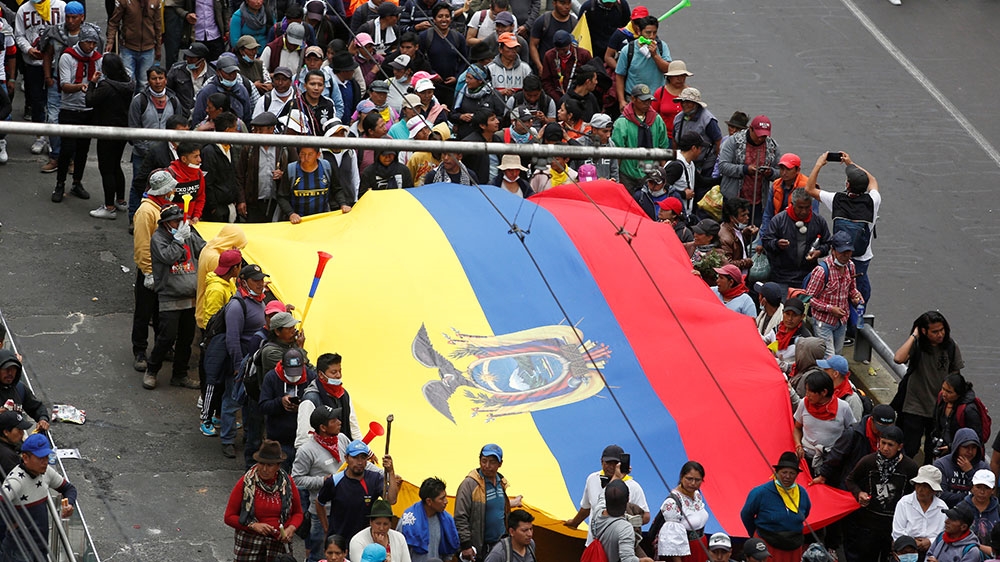Ecuador unrest: Protesters raise heat on defiant Moreno
National strike closed schools and business as protesters rallied for 7th day against austerity measures.

Ecuadorean security forces clashed with masked protesters during indigenous-led demonstrations and a national strike on Wednesday as President Lenin Moreno stuck by austerity measures that have triggered the worst unrest in a decade.
In Latin America‘s latest flare-up over unpopular structural economic reforms, the shutdown cleared many streets of traffic, schools closed and businesses shuttered from the highland capital Quito to coastal city Guayaquil.
Keep reading
list of 4 itemsWhen will EVs become mainstream in the US?
Key takeaways from Xi Jinping’s European tour to France, Serbia and Hungary
Air Vanuatu goes into liquidation, thousands of passengers stranded
Though the wider demonstrations were peaceful, in some places protesters hurled stones and sticks at police who fired tear gas back. In Quito, several people fell injured, witnesses said, as helicopters buzzed downtown.
“Our flag is red, like the blood of the working class!” chanted marchers in Quito, beside graffiti against Moreno and the IMF.
Protests erupted in the Andean nation of 17 million people a week ago when Moreno cut fuel subsidies as part of a package of measures in line with a $4.2bn IMF loan.
“What the government has done is reward the big banks, the capitalists, and punish poor Ecuadoreans,” said Mesias Tatamuez, head of the Workers’ United Front umbrella union.

The main indigenous group CONAIE, which has mobilised some 6,000 members to Quito from outlying areas, said Moreno’s government was behaving like a “military dictatorship” by declaring a state of emergency and setting an overnight curfew.
Protesters barricaded roads in various parts of Ecuador from Wednesday morning with debris, while security forces blocked a major bridge in Guayaquil to thwart them.
Moreno, 66, who succeeded leftist leader Rafael Correa in 2017, has relocated his government to Guayaquil where there has been less trouble than in Quito.
The demonstrators’ main demand is the withdrawal of the fuel subsidy cut, which has sent transport and food prices soaring, though some were also urging Moreno to quit.
“I don’t see why I should if I’m making the right decisions,” Moreno said late on Tuesday, arguing Ecuador’s large debt and fiscal deficit necessitated belt-tightening reforms.
For seven days, protesters have been marching and barricading roads with burning tyres, while police in armoured vehicles have responded with water cannon and tear gas.
“Moreno out!” and “Police murderers!”, demonstrators shouted on Wednesday.
Hundreds of arrests
The unrest was the second major challenge to a South American leader this year over opposition to the IMF. Argentine President Mauricio Macri was trounced in an August primary vote amid stiff opposition to an IMF deal he signed last year.
Authorities in Ecuador have arrested 756 people in a week of unrest, and dozens of police officers have been injured.
One man died after he was hit by a car and an ambulance could not reach him amid the chaos, while another two people fell off a bridge during protests, with some unconfirmed reports that they died.
Oil Minister Carlos Perez said the OPEC member nation had lost 232,000 barrels of production from the unrest, worth more than $12.5 million, after protesters entered some fields.
Soldiers were helping retake control of the important Sacha field, the ministry said, but half a dozen others remained closed.
State firm Petroecuador, which normally transports 360,000 barrels a day to the Pacific Coast, halted operations of its Trans-Ecuadorean Pipeline System (SOTE) and weighed declaring force majeure on international contracts.
Ecuador’s debt sold off. The March 2022 bond, though still trading above par, was down nearly $0.06 to its lowest since February, its yield briefly topping nine percent for the first time in eight months.
The government hopes mediators can help and is promising measures to offset prices rises, including extra welfare benefits for the poor and credits for farmers.
Vice President Otto Sonnenholzner said a dialogue had begun with the indigenous and union movements, supported by the United Nations, Catholic Church and university rectors.
“We’re talking and we have made some advances,” he told reporters, blaming “paid gangs” for the disturbances.
Moreno has accused former friend, mentor and boss Correa of seeking a coup with the help of fellow socialist President Nicolas Maduro in Venezuela. But no evidence has been given.
Moreno had enthusiastically backed Correa during his decade-long rule, serving as his vice president, but broke with him after winning the election and moved economic policies to the right.
From Belgium where he lives, Correa has been applauding the demonstrators but scoffed at accusations of seeking a coup. Maduro, himself immersed in an economic crisis in Venezuela, also denied involvement in Ecuador.
Moreno has support from the business elite and the military appears to remain loyal, but his popularity is less than half of what it was two years ago and he knows that indigenous protests helped topple three presidents before Correa.
“I feel betrayed by Moreno,” said printer and father-of-eight Luis Calvopina, 53. “I don’t want him to quit, but I do want him to reverse this stupidity.”